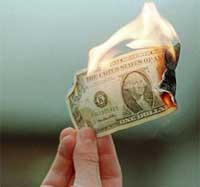Rising Cost of Living is Killing Housing Affordability
 The latest mortgage activity data, reported Wednesday by the Mortgage Bankers Association, offered good news for those on the cusp of home ownership. The affordability of the American dream improved again in the week ending May 13, 2011.
The latest mortgage activity data, reported Wednesday by the Mortgage Bankers Association, offered good news for those on the cusp of home ownership. The affordability of the American dream improved again in the week ending May 13, 2011. Our founder earned clients a 23% average annual return over five years as a stock analyst on Wall Street. "The Greek" has written for institutional newsletters, Businessweek, Real Money, Seeking Alpha and others, while also appearing across TV and radio. While writing for Wall Street Greek, Mr. Kaminis presciently warned of the financial crisis.
Our founder earned clients a 23% average annual return over five years as a stock analyst on Wall Street. "The Greek" has written for institutional newsletters, Businessweek, Real Money, Seeking Alpha and others, while also appearing across TV and radio. While writing for Wall Street Greek, Mr. Kaminis presciently warned of the financial crisis.Relative tickers: NYSE: BAC, NYSE: GS, NYSE: MS, NYSE: WFC, NYSE: TD, OTC: FMCC.OB, OTC: FNMA.OB, NYSE: PNC, NYSE: JPM, NYSE: BBT, NYSE: CIT, NYSE: BKU, Nasdaq: UBSI, NYSE: BK, Nasdaq: MBFI, NYSE: AF, NYSE: NYB, Nasdaq: HCBK, Nasdaq: PBCT, Nasdaq: FNFG, Nasdaq: CFFN, Nasdaq: WFSL, Nasdaq: ISBC, Nasdaq: NWBI, Nasdaq: STSA, NYSE: OCN, NYSE: FBC, NYSE: PFS, Nasdaq: COLB, Nasdaq: KRNY, Nasdaq: BRKL, Nasdaq: DCOM, Nasdaq: FFIC, Nasdaq: DNBK, OTC: FCNCA.PK, NYSE: SNV, Nasdaq: UBSI, Nasdaq: HMPR, Nasdaq: WSBC, Nasdaq: CHCO, Nasdaq: SASR, OTC: FCBN.OB, Nasdaq: SCBT, NYSE: WL, Nasdaq: WSFS, Nasdaq: SBSI, Nasdaq: STEL, Nasdaq: UBSH, Nasdaq: EGBN, Nasdaq: FBNC, Nasdaq: ABCB, Nasdaq: TBBK, Nasdaq: FCBC, Nasdaq: CCBG, Nasdaq: FISI, Nasdaq: NKSH, Nasdaq: CZNC, Nasdaq: CHFN, Nasdaq: SBCF, Nasdaq: TIBB, Nasdaq: AMNB, Nasdaq: UCBI, Nasdaq: MBRG, Nasdaq: HBOS, Nasdaq: ZION, Nasdaq: EWBC, NYSE: CYN, NYSE: BOH, Nasdaq: SIVB, Nasdaq: WABC, Nasdaq: CATY, Nasdaq: UMPQ, Nasdaq: GBCI, Nasdaq: PCBC, Nasdaq: PACW, NYSE: WAL, OTC: FBAK.OB, Nasdaq: FIBK, Nasdaq: NARA, Nasdaq: WCBO, Nasdaq: TCBK, Nasdaq: TBNK, Nasdaq: WCBO, Nasdaq: BMRC, Nasdaq: HAFC, NYSE: DIA, NYSE: SPY, Nasdaq: QQQQ, NYSE: DOG, NYSE: SDS, NYSE: QLD, NYSE: NYX, NYSE: ICE, Nasdaq: NDAQ
Rising Cost of Living is Killing Housing Affordability
The latest take on weekly mortgage activity showed an inrease of 7.8% in the MBA’s Market Composite Index. The latest surge follows an increase of 8.2% the week before. It’s no coincidence either, as mortgage rates have been diving, down 53 basis points now from this year’s peak. In the latest measured period, contracted rates on 30-year and 15-year fixed rate mortgages averaged 4.6% (down from 4.67% last week) and 3.75% (down from 3.81%), opening up opportunity for many.
Sadly though, the latest reported period saw no follow-through in Purchase Activity, which was up 6.7% the week before. Rather, this week, the MBA’s seasonally adjusted Purchase Index fell 3.2%. Opportunistic refinancing activity continued though, as the Refinance Index climbed 13.2%, marking its busiest state since this past December.
This latest contrast in activity is quite deflating for real estate hopefuls, as housing affordability beckons for growth now. Distressed properties and the deflating bubble have taken the average price of a home down 32.6% from its peak in mid-2006, according to Case Shiller’s latest published 20-City Index covering through February 2011. Mortgage rates are certainly inviting enough. Unfortunately, there’s a good reason for all that.
The economy is in the dumps, and the reason rates are driving lower now is because of renewed economic concerns. The flow of economic data of late has offered little good news, showing prices on the rise as economic growth decelerates. The latest brick in the wall of worry is a rather large, sharp and otherwise dangerous looking block. It’s this whole debt ceiling catastrophe that’s waiting to happen at the hands of political bumbling. The general budget deficit was growing its own teeth well enough, given the warning from Standard & Poor’s that time is running out on our bad borrowing ways. But then we get word from the Treasury that the government’s failure to raise the debt ceiling threatens technical default.
 For most Americans, technical default is just as bad as real default, since the bank is taking possession of whatever collateral we have laid up either way. But for the government, it’s a little different. Our creditors know we’re still good for what we owe them, and that once we work it out with the wife, they’ll get paid. The wife in this instance is the Republican Party, though she doesn’t have a good record either in the spending department. When she sees something she likes, say for instance war with Iraq or defense spending generally, she doesn’t give a second thought to whipping out the credit card. Anyway, for now, the GOP is playing the money conscious wife.
For most Americans, technical default is just as bad as real default, since the bank is taking possession of whatever collateral we have laid up either way. But for the government, it’s a little different. Our creditors know we’re still good for what we owe them, and that once we work it out with the wife, they’ll get paid. The wife in this instance is the Republican Party, though she doesn’t have a good record either in the spending department. When she sees something she likes, say for instance war with Iraq or defense spending generally, she doesn’t give a second thought to whipping out the credit card. Anyway, for now, the GOP is playing the money conscious wife.It’s now evident to just about every American that there’s a limit to our credit, and we’re getting close to it. Yet, the economy is not as healthy as we would have hoped it would be at this point in the cycle. So, even though we could use more stimulant, empty coffers call for financial prudence. It’s defacto austerity, and we know how well that goes over as medicine for a vulnerable economy. All we have to do is take a peer over the pond to Portugal and Greece to see our potential future. Meanwhile, we know Americans are spending less with gasoline hovering around $4, and with the massive Mississippi threatening to force prices higher. So, even as housing affordability beckons, Americans are unable to act while handcuffed by fiscal threats and financial fears, and while held at gunpoint by gasoline.

Editor's Note: Article should interest investors in Bank of America (NYSE: BAC), Freddie Mac (OTC: FMCC.OB), Fannie Mae (OTC: FNMA.OB), Goldman Sachs (NYSE: GS), Morgan Stanley (NYSE: MS), Wells Fargo (NYSE: WFC), Toronto Dominion (NYSE: TD), BB&T (NYSE: BBT), CIT (NYSE: CIT), Bank United (NYSE: BKU), First Citizens (OTC: FCNCA.PK), Synovus (NYSE: SNV), United Bankshares (Nasdaq: UBSI), Hampton Roads Bankshares (Nasdaq: HMPR), WesBanco (Nasdaq: WSBC), City Holding (Nasdaq: CHCO), Sandy Spring (Nasdaq: SASR), First Citizens (OTC: FCBN.OB), SCBT Financial (Nasdaq: SCBT), Wilmington Trust (NYSE: WL), WSFS Financial (Nasdaq: WSFS), Southside Bancshares (Nasdaq: SBSI), Stellar One (Nasdaq: STEL), Union First Market (Nasdaq: UBSH), Eagle Bancorp (Nasdaq: EGBN), First Bancorp (Nasdaq: FBNC), Ameris (Nasdaq: ABCB), The Bancorp (Nasdaq: TBBK), First Community (Nasdaq: FCBC), Capital City (Nasdaq: CCBG), Financial Institutions (Nasdaq: FISI), National Bankshares (Nasdaq: NKSH), Citizens & Northern (Nasdaq: CZNC), Charter Financial (Nasdaq: CHFN), Seacoast Banking (Nasdaq: SBCF), TIB Financial (Nasdaq: TIBB), American National (Nasdaq: AMNB), United Community (Nasdaq: UCBI), Middleburg Financial (Nasdaq: MBRG), Heritage Financial (Nasdaq: HBOS), Zions Bancorp (Nasdaq: ZION), East West Bancorp (Nasdaq: EWBC), City National (NYSE: CYN), Bank of Hawaii (NYSE: BOH), SVB Financial (Nasdaq: SIVB), Westamerica (Nasdaq: WABC), Cathay General (Nasdaq: CATY), Umpqua (Nasdaq: UMPQ), Glacier Bancorp (Nasdaq: GBCI), Pacific Capital (Nasdaq: PCBC), PacWest (Nasdaq: PACW), Western Alliance (NYSE: WAL), First National Alaska (OTC: FBAK.OB), First Interstate Bancsystem (Nasdaq: FIBK), Nara (Nasdaq: NARA), West Coast (Nasdaq: WCBO), TriCo (Nasdaq: TCBK), Territorial (Nasdaq: TBNK), Washington Banking (Nasdaq: WCBO), Bank of Marin (Nasdaq: BMRC), Hanmi (Nasdaq: HAFC), PNC Bank (NYSE: PNC), J.P. Morgan Chase (NYSE: JPM), United Bankshares (Nasdaq: UBSI), Bank of New York Mellon (NYSE: BK), MB Financial (Nasdaq: MBFI), Astoria Financial (NYSE: AF), New York Community (NYSE: NYB), Hudson City (Nasdaq: HCBK), People’s United (Nasdaq: PBCT), First Niagra (Nasdaq: FNFG), Capitol Federal (Nasdaq: CFFN), Washington Federal (Nasdaq: WFSL), Investor’s Bancorp (Nasdaq: ISBC), Northwest Bankshares (Nasdaq: NWBI), Sterling Financial (Nasdaq: STSA), Ocwen (NYSE: OCN), Flagstar (NYSE: FBC), Provident (NYSE: PFS), Colombia Banking (Nasdaq: COLB), Kearny (Nasdaq: KRNY), Brookline (Nasdaq: BRKL), Dime Community (Nasdaq: DCOM), Flushing Financial (Nasdaq: FFIC), Danvers (Nasdaq: DNBK).
Please see our disclosures at the Wall Street Greek website and author bio pages found there. This article and website in no way offers or represents financial or investment advice. Information is provided for entertainment purposes only.

Labels: Economy, Editors_Picks, Housing, Real Estate, Real-Estate











3 Comments:
Of course, when dear leader Obama was in the opposition, he voted against raising the debt ceiling. But, I guess, that made him a good wife.
BTW - The Iraq war had bi-partisan support in congress. Among the Dems who supported it were VP Biden and SecState Clinton. One can certainly disagree with the Iraq war, but to say that was a one-sided spending issue is wrong. In fact, all of the big spending policies under GWB (like the prescription drug benefit, the Education Reform and even the tax cuts) had bi-partisan support. In the case of the drug benefit and Education, the Dems even wanted to spend more than what GWB coughed up. (I just want you to admit that you're a democrat leaner and get off the 'noble independent' line).
I was a lifelong Republican, a Reagan disciple, who voted against Greek-American Michael Dukakis. That's party loyalty and ideological confirmation.
HOWEVER, my eyes have been opened thanks to my time on Wall Street and my maturation as an adult. I can discern now, and I don't like what I see far too often from the party that is supposed to represent my conservative values and be compatible with my core business sense.
The faults of both parties have proven too important for me to sit anywhere other than Independent now. Therefore, if I should ever run for office under either party, I would seek to change some things about the party line and best represent broader America.
How can you classify yourself as a member of either party? The ideologies have become too embedded to fit for any American any longer.
How can a priest support the Democrats OR the Republicans? Who supports righteousness? Who supports the poor who are incapable of helping themselves? Neither is a perfect fit for the good priest nor for me.
I enjoy reading your perspective, but you seem to bend over backwards to give BHO a little too much credit and GWB a little too much blame.
Post a Comment
<< Home